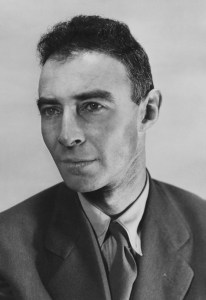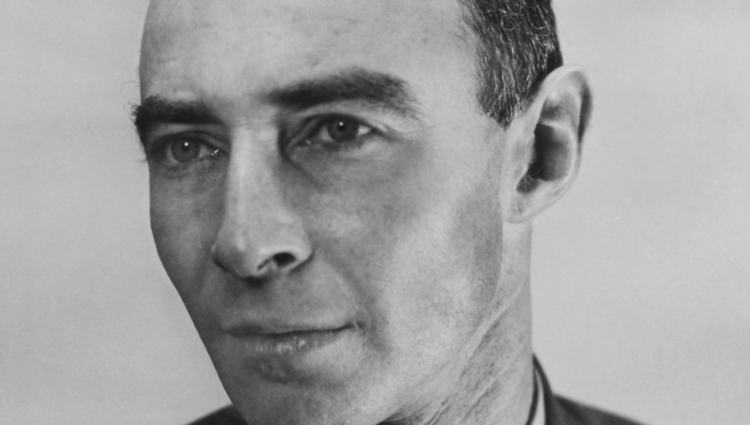Like the Greek tragic heroes of Oedipus and Prometheus, Oppenheimer used his almost superhuman intellect and ability to achieve something that led not only to his own suffering, but also to the suffering of others. Americans today would do well to heed the lessons passed down from the Greek tragedians about the reckless and stubborn pursuit of hidden knowledge and new technologies.
 Prometheus stole fire from the gods and gave it to man. For this he was chained to a rock and tortured for eternity.” These chilling words appear in the opening title sequence of Christopher Nolan’s newest film, Oppenheimer, about the life of J. Robert Oppenheimer, the father of the atomic bomb. Nolan’s film catalogues Oppenheimer’s education and early career as a theoretical physicist, his involvement in and leadership of the Manhattan Project commissioned by the United States government to create a nuclear weapon to use in World War II, and the political and social fallout from the bomb’s use on Japan. While Oppenheimer himself is a complex and consequential figure in American and world history, Nolan’s portrayal of Oppenheimer goes deeper than mere biography. Nolan’s Oppenheimer shares many similarities with the ideal Greek tragic hero, such as Prometheus and Oedipus. In the film, Oppenheimer begins as an enviable character of high status but because of his academic brilliance and pursuit of knowledge, his greatest achievement becomes a source of pain and suffering.
Prometheus stole fire from the gods and gave it to man. For this he was chained to a rock and tortured for eternity.” These chilling words appear in the opening title sequence of Christopher Nolan’s newest film, Oppenheimer, about the life of J. Robert Oppenheimer, the father of the atomic bomb. Nolan’s film catalogues Oppenheimer’s education and early career as a theoretical physicist, his involvement in and leadership of the Manhattan Project commissioned by the United States government to create a nuclear weapon to use in World War II, and the political and social fallout from the bomb’s use on Japan. While Oppenheimer himself is a complex and consequential figure in American and world history, Nolan’s portrayal of Oppenheimer goes deeper than mere biography. Nolan’s Oppenheimer shares many similarities with the ideal Greek tragic hero, such as Prometheus and Oedipus. In the film, Oppenheimer begins as an enviable character of high status but because of his academic brilliance and pursuit of knowledge, his greatest achievement becomes a source of pain and suffering.
Like Oedipus, Oppenheimer is an admirable character because of his pursuit of hidden knowledge and his high status in society as an eminent physicist. In the beginning of the movie, Nolan portrays Oppenheimer as a promising young scientist whose brilliant mind and determination earns him the respect and admiration of the world’s top scientific minds, like Einstein and Bohr, as well as a professorship in one of the top colleges in the United States. What sets him apart is his fascination with the atomic energy that powers the sun. Throughout these early scenes, Nolan puts the audience in Oppenheimer’s mind, which is filled with electrons flying around a nucleus, pulsating with unfathomable energy. He dreams of harnessing this energy and endeavors to be the first to discover this secret knowledge.
Although Oedipus was not a nuclear physicist, he too sought knowledge and was renowned for his wisdom. It was through his wisdom and ability to solve riddles that he secured the kingship of Thebes and enjoyed the highest status afforded to the ancient Greeks. Through their pursuit of knowledge and ability to solve complex problems, both characters achieve one of the highest and most enviable positions available in their respective cultures. It is interesting to note that Oppenheimer’s enviable status as a professor of science at a top university demonstrates how Americans’ values differ from the Greeks. Instead of envying the political power of a king, American audiences seem to envy the power and influence of scientists. The last few years alone, particularly with the rise of artificial intelligence, have shown us just how influential the rising class of technocrats can be.
Oppenheimer’s intelligence and ambition are indeed praiseworthy, yet these positive traits comprise his tragic flaw. While the audience watches Oppenheimer rise to the top of his field, we know that his knowledge will be used for a weapon of mass destruction. Nolan makes it clear from the opening quotation about Prometheus that, just like one of the oldest tragic heroes in Greek mythology, Oppenheimer’s downfall is caused by his reaching out for the secret of fire from the gods. Although Oppenheimer has many flaws, such as his infidelity to his wife and his association with and entertaining of communist ideas, the thing that causes the most damage is his determination to be the first to harness the power of the atom. Similarly, Oedipus struggled with anger and pride, but the thing that directly led to his downfall was his determination to find the killer of Laius and to discover his own identity.
While Oppenheimer’s creation of the bomb and Oedipus’ investigation of his identity lead to their downfall, the nature and consequences of their downfalls are very different. One of the most stunning images in the film is the giant fireball and mushroom cloud produced when they test the bomb for the first time. Characters stare and marvel at the explosion from a distance, with expressions that are a mixture of awe and wonder and of shock and horror. Although Nolan does not portray the bombings of Hiroshima and Nagasaki, he allows the audience to feel the weight of the tragedy they caused by depicting Oppenheimer’s reaction to the news that America defeated Japan. In another heart-pounding scene, Nolan shows the roaring crowds cheering and stomping for Oppenheimer, the one who made America’s victory possible. At first the noise evokes a sense of triumph, but as the noise increases and continues, Oppenheimer (and the audience through him) begins to imagine the cries of grief and anguish of the thousands killed by the bomb. This functions as one of the cathartic moments of the movie, one that helps or even pushes the audience to feel pity for Oppenheimer as he struggles to process the destruction caused by his invention and, at the same time, to feel afraid and horrified that such destruction could be met with thunderous applause.
The catastrophe for Oppenheimer does not lead to physical pain like in the story of Oedipus but to psychological agony. On the one hand, when Oedipus discovers the horror of what he had done, he puts out his own eyes and forces himself into exile. These self-inflicted injuries arouse pity and fear because of the audience’s visceral reaction to such a horrible sight. On the other hand, when Oppenheimer hears of the devastation in Japan, he does not feel or subject himself to physical pain. The mere realization that the bomb he created was now out of his hands and could be used by his own country to kill thousands of innocent lives becomes a source of psychological torment. The gravity of his situation is perfectly captured in one of his most famous and haunting lines: “Now, I am become Death, the destroyer of worlds.”
Like the Greek tragic heroes of Oedipus and Prometheus, Oppenheimer used his almost superhuman intellect and ability to achieve something that led not only to his own suffering, but also to the suffering of others. Americans today would do well to heed the lessons passed down from the Greek tragedians about the reckless and stubborn pursuit of hidden knowledge and new technologies. Nolan seems to be offering his own commentary on the problems with America’s obsession over new scientific discoveries and technological innovations. The ethical questions raised by the atomic bomb can and should also be raised about the emergence of artificial intelligence, gene-editing programs, and new ways to prolong or efficiently terminate human life. Nolan’s strongest warning comes at the very end of the film, when Oppenheimer confesses to Einstein that what was started at Los Almos and the Manhattan Project may have triggered a chain reaction that will consume the world in unquenchable fire.
The Imaginative Conservative applies the principle of appreciation to the discussion of culture and politics—we approach dialogue with magnanimity rather than with mere civility. Will you help us remain a refreshing oasis in the increasingly contentious arena of modern discourse? Please consider donating now.
The featured image is a photograph of J. Robert Oppenheimer taken in 1944, and is in the public domain, courtesy of Wikimedia Commons.


